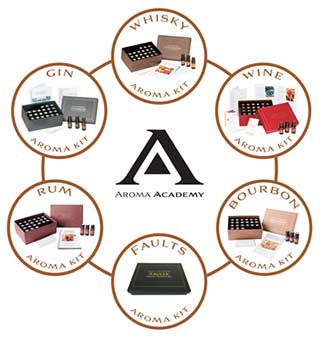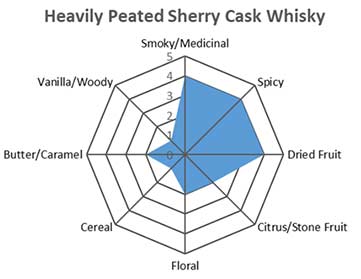For the past decade we have been on the track to improving evaluation and establishing a diagnostics discipline to create a universal language providing clear and uniform views of spirits’ character and descriptions for all who taste, evaluate, enjoy and collect spirits. Our efforts in this Evaluation Academy are echoed by a few others, worldwide. One proponent of uniformity is located in Scotland, UK, is SATS, Scent & Aroma Technology Systems, also known as The Aroma Academy.
Echoing similar views as Arsilica, Inc, The Aroma Academy provides complete evaluation education with training classes in diagnostic methods and procedures and the descriptive verbiage and vocabulary which are absolutely necessary to applied spirits evaluation. Supplementing their training, they have developed and produced character aroma kits to train serious evaluators to a high level of proficiency in aroma detection and identification. Their association with top spirits producers and educators is proof enough of their acceptance within the industry as a reputable source for evaluation products and training. Explore their informative website.
Alan Gordon, CEO of The Aroma Academy and SATS, explains their professional approach to evaluation:
Developing Sensory Skills – A systematic approach that works!
Introduction
You bring your spirits glass to your nose and you enjoy the bouquet of the myriad aromas. You take a sip, swirl the flavoursome liquid in your mouth and swallow. The aromas and the flavours are so familiar, but how would you describe them? You know them! You recognise them! However, you cannot name them!
This is a problem that we encounter all over the world and is a scenario that is so common that, at the Aroma Academy, we have developed a term for it – we call it ‘The Word Problem™’ – and it represents the many moments when your brain is met with aroma or flavour signals that are very familiar and, yet, cannot be identified!
On reflection, this ‘problem’ should not be a surprise as very few people ever give any consideration to their Sense of Smell, their appreciation of Flavour, or undertake any training related to sensory ability. So, most people go through the same chaotic process when they nose or sample a spirit. They recognise a familiar aroma or flavour, cannot identify it and then proceed to randomly search their memory bank to attempt to recollect – usually in vain – some past event when they think that they may have encountered it before.
At the Aroma Academy, we aim to solve The Word Problem™ via a systematic and scientific approach which is actually very simple in concept and execution, yet, as with so many simple approaches, so rarely implemented.
Methodology
We have three key elements to our Sensory Skills development methodology;
- Vocabulary
- ‘Anchoring the Vocabulary’ to Standards
- Articulation
with the methodology focused on the development of Aroma Recognition and grounded in the fact that the vast majority of the Flavour experience comes via the Sense of Smell – both ortho-nasal and retro-nasal – with additional contributions from the Sense of Taste, the Trigeminal Sense and the linked descriptor ‘Mouthfeel.’
Choice of Descriptor/Evaluation Vocabulary
It cannot be emphasised too strongly, that familiarisation with the key Vocabulary terms for a drinks category is one of the foundation stones in the development of Sensory Skills and associated evaluation capability. The whole topic of Vocabulary is a key focus of our Sensory Training where we explore vocabulary terms, descriptors, groupings and tools for different drinks categories.
Development of Aroma Standards
Irrespective of the particular Vocabulary Scheme utilised, it is important, (with vested interest noted!) to ‘close the loop’ by having Sets of Standards that represent the Vocabulary terms. This is important for many reasons, including the fact that each individual will have a slightly different interpretation of what is meant by a Vocabulary term and, the fact that many people may never have previously encountered an aroma or flavour referenced by a Vocabulary term. In essence, the presence of Aroma Standards allows the following practical unequivocal statement to be made;
‘This is what I mean by (insert key Vocabulary term.)

At the Aroma Academy, it is the creation of the Aroma Standards that has consumed the majority of our Product Development effort and it is important that, at minimum, the Standards have attributes including stability, repeatability, relevance to the Drinks category and are nuanced to be representative of the Vocabulary term for the drinks category. It is also important to note that the methodology allows sensory familiarisation with the category Standards without interference from the stinging, numbing effect of concentrated alcohol.

The Individuality of Sensory Ability
No exploration of the development of Sensory Skills would be complete without reference to the ‘Individuality of Sensory Ability.’ It is not possible to review this subject in detail here, but there must be cognizance regarding this topic. Suffice to mention, that the concept of individuality overlays a whole level of complexity in the Sensory world as, in simple language, ‘everyone is wired differently’ and, whilst Sensory Skills can undoubtedly be developed to help identity and articulate flavour profiles, there is no escaping the fact that each individual has a different level of sensitivity to different aromas and flavours. It is worthy of note that understanding individual strengths and weaknesses in terms of Sensory ability is particularly important in the work that we undertake with the Sensory Panels responsible for Quality Control in drinks producers. It is also quite thought-provoking to consider that each individual is experiencing the world differently from everyone else!

Summary Notes regarding Aroma Academy
Aroma Academy provides a series of Aroma Standards Sets, Sensory Training Programmes and Competency/Testing Systems with a particular focus on the Drinks Industry. The Sensory Training provides a step-by-step methodology to develop Aroma/Flavour Recognition skills and the majority of the company’s product development has been focused on the creation of stable, repeatable Standards for different drinks categories including Whisky, Bourbon, Gin, Rum and Wine in collaboration with relevant industry category experts. It counts many of the drinks industry’s leading companies in its customer base and is active in Aroma Marketing in addition to its Sensory products and programmes.
Takeaway: There are many sources out there to help you improve your olfactory and develop evaluation skills. When choosing, look for companies who are involved in the scientific aspect of evaluation, work directly with spirits companies, and are making major contributions to the industry through their research. See what spirits educators across the country say about our scientific approach to tasting.
Alan Gordon, CEO & Co-Founder, Aroma Academy
Our next presentation will discuss spirits rating systems







